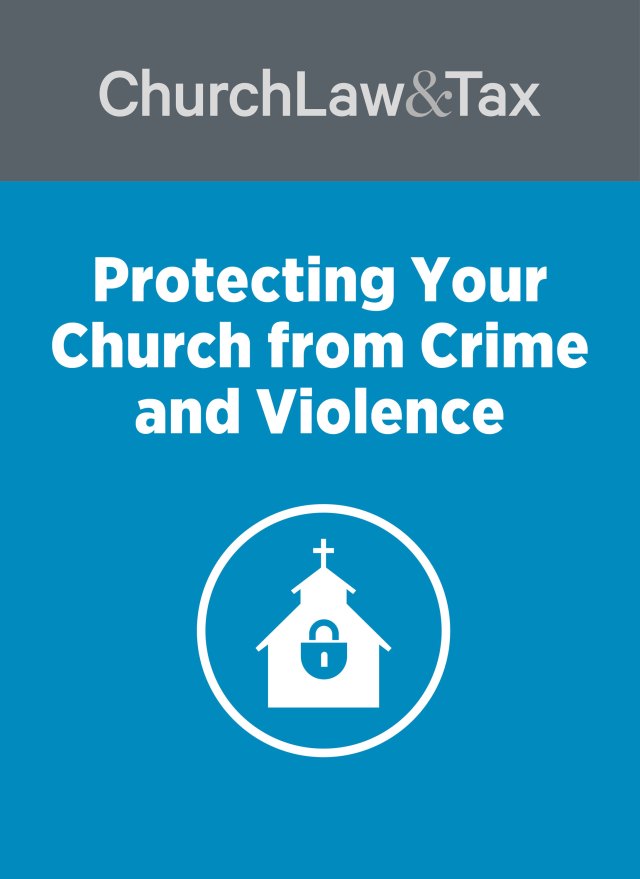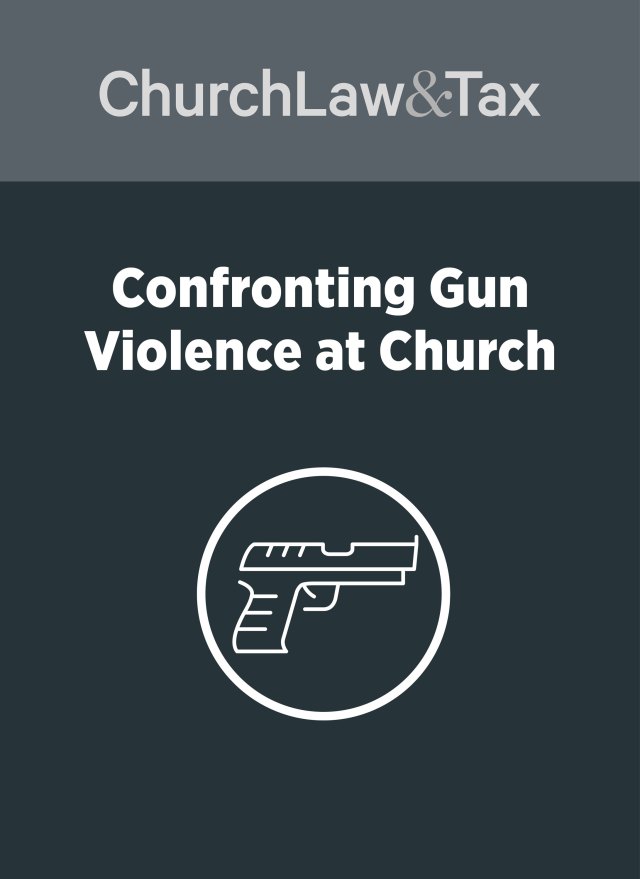Key point. State laws prohibiting holders of concealed weapons permits from carrying weapons on church property do not necessarily violate the First Amendment guaranty of religious freedom or the Second Amendment right to bear arms.
Does a state law prohibiting the carrying of concealed weapons in a church violate the constitutional rights of church members to bear arms and practice their religion? A federal court in Georgia said no. In 2010, the State of Georgia enacted a law making it a misdemeanor offense for a person with a concealed weapons permit to carry a concealed weapon “in a place of worship.” Several plaintiffs, including a church and its pastor, filed a lawsuit challenging the constitutionality of this law.
First Amendment guaranty of religious freedom
The plaintiffs claimed that the statute violated their First Amendment right to freely exercise their religion because it imposed an impermissible burden on their ability to attend or conduct worship services by prohibiting them from carrying a firearm on their person for self defense while doing so. The individual plaintiffs did not contend that their religious beliefs required them to carry a firearm into a place of worship, nor did the church allege that its members’ religious beliefs required them to carry a firearm into their church. Instead, the plaintiffs claimed that attending worship services is a sincere religious belief that has been impermissibly burdened by the statute’s requirements.
The court noted that the Georgia statute prohibiting concealed weapons licensees from bringing weapons onto church property “does not prohibit anyone from attending services at a place of worship. Instead, any burden on attending worship services is attenuated and tangential because the law only requires that persons either not carry a weapon to a place of worship, leave their weapons secured in their vehicles, or notify security or management personnel of the presence of the weapon and follow directions for removing, securing, storing, or temporarily surrendering the weapon.”
The court noted that “laws imposing substantial burdens on religious practices” need a “compelling government interest” to survive a First Amendment challenge. It concluded, however, that the Georgia statute “does not pressure religious conduct enough to constitute a substantial burden” on religious practices:
No criminal sanctions forbid plaintiffs from attending a place of worship. The law does not force them to decide between attending worship services or supporting themselves and their families. Instead, plaintiffs only risk criminal sanction if they refuse to comply with the law’s mandates about carrying firearms in a place of worship, an activity they do not attach to any sincere religious belief. The burden of complying with the law’s requirements does not prohibit them from attending worship services, nor does it place an “unmistakable” pressure on them “to forego religious precepts.” Accordingly, the court concludes that any burden posed by the law is too insubstantial and too attenuated to any of plaintiffs’ sincere religious beliefs to state a claim under the [First Amendment].
The church also claimed that the Georgia statute violated the First Amendment’s guaranty of religious freedom since it “encroaches on the church’s ability to manage its internal affairs.” The church cited a case in which the United States Supreme Court observed that “there exists a spirit of freedom for religious organizations, an independence from secular control or manipulation, in short, power to decide for themselves, free from state interference, matters of church government as well as those of faith and doctrine.'” Kedroff v. St. Nicholas Cathedral, 344 U.S. 94 (1952). However, the Georgia court noted that the Supreme Court’s ruling makes clear that the First Amendment guaranty of religious freedom is “only implicated when the state interferes with matters of church government, faith, or doctrine. The law at issue here does not touch on such ecclesiastical matters. The church does not allege that the safety concerns or security protocols of a place of worship involve issues of religious faith or doctrine, as opposed to purely secular issues. Consequently, the law in this case does not encroach on the church’s ability to manage its internal affairs in a way that violates the First Amendment.”
the Second Amendment right to bear arms
The plaintiffs also claimed that the Georgia statute impermissibly burdened their right to keep and bear arms secured by the Second Amendment. The Second Amendment provides: “A well regulated Militia, being necessary to the security of a free State, the right of the people to keep and bear Arms, shall not be infringed.” The plaintiffs relied on a 2008 decision by the Supreme Court. District of Columbia v. Heller, 554 U.S. 570 (2008). In the Heller case, the Supreme Court ruled that several statutes in the District of Columbia which, taken together, amounted to a total ban on possessing a handgun in the home, violated the Second Amendment. But the only conduct that the Supreme Court clearly located within the Second Amendment right was the possession and carrying of a handgun by an otherwise qualified person within his home for self defense. It carefully noted that “the right secured by the Second Amendment is not unlimited,” and that “historically, the right had never been viewed as a right to keep and carry any weapon whatsoever in any manner whatsoever and for whatever purpose.”
The Georgia court concluded that the Supreme Court’s decision in Heller did not address or resolve the question of whether the Georgia statute prohibiting citizens with a concealed weapons license from bringing their weapons onto church property violated the Second Amendment right to bear arms. The court concluded that the Georgia law was constitutionally valid since it was “substantially related to an important governmental objective,” namely, protecting the free exercise of religion. The court observed: “Although the Constitution protects a person’s right to free exercise [of religion] only against governmental intrusion, it is clear that the protection of religious freedom against private bias or coercion is also an important governmental goal. Prohibiting the carrying of firearms in a place of worship bears a substantial relationship to that important goal by protecting attendees from the fear or threat of intimidation or armed attack.” In other words, the court concluded that the constitutional guaranty of religious freedom was better served by prohibiting guns on church premises than by allowing them.
The court clarified that the Georgia statute’s ban against concealed weapons on church property did not extend to church-owned parsonages, and therefore pastors who live in a parsonage are not prohibited from having a weapon on the premises.
The court also clarified that the statute would not bar pastors from carrying or possessing a concealed weapon while in their church office for security reasons. The court observed:
Although the statute generally prohibits persons with valid Georgia Weapons Licenses from carrying a firearm in a place of worship, the statute also provides that the prohibition on carrying in the unauthorized locations … does not apply to … “a license holder who approaches security or management personnel upon arrival and notifies such security or management personnel of the presence of the weapon and explicitly follows the security of management personnel’s direction for removing, securing, storing, or temporarily surrendering such weapon.” O.C.G.A. § 16-11-127(d) (2). As a result, the statute would allow [a pastor] to keep a firearm in his office if he obtained permission from security or management personnel of the church and kept it secured or stored as directed. If management or security personnel at the church, which presumably includes [the pastor] as CEO, did not grant him permission to secure or store a firearm in his office, then that would be at their discretion. Plaintiffs do not argue, however, that they possess a constitutional right to carry a firearm onto private property against the wishes of the owner or controller of the property.
Application. This case is important, for it is the first case to address the constitutionality of state laws barring holders of concealed weapons licenses to bring their weapons onto designated properties, including churches. According to this court, such restrictions do not violate either the First Amendment guaranty of religious freedom, or the Second Amendment right to bear arms. However, the court clarified that such restrictions do not extend to church-owned parsonages.
The court’s analysis of the Second Amendment right to bear arms is interesting. The court noted that the Supreme Court’s 2008 decision in the Heller case, which struck down D.C. statutes prohibiting the possession of firearms in one’s home, was limited to the principle that the Second Amendment protects the right of private citizens to own firearms in their homes for the purpose of self-defense. This narrow ruling did not directly apply to the scenario in this case, which involved a state’s attempt to restrict the carrying of firearms on church property. It also is interesting to note that the court concluded that the Second Amendment right to bear arms was not violated by the Georgia statute since the statute was “substantially related to an important governmental objective”—namely, the protection of church members’ right to freely exercise their religion by alleviating their fear of armed attack. Of course, this conclusion naively assumes that crazed assailants will comply with the law’s requirement that they not bring their weapons onto church property. It also fails to note that many church members’ fear of armed attack will be enhanced by the law’s prohibition of the carrying of weapons on church property by law-abiding members. Ironically, the court concluded that the constitutional guaranty of religious freedom was better served by prohibiting guns on church premises than by allowing them. GeorgiaCarry.Org, Inc. v. Georgia, 2011 WL 240108 (M.D. Ga. 2011).
This Recent Development first appeared in Church Law & Tax Report, May/June 2011.




